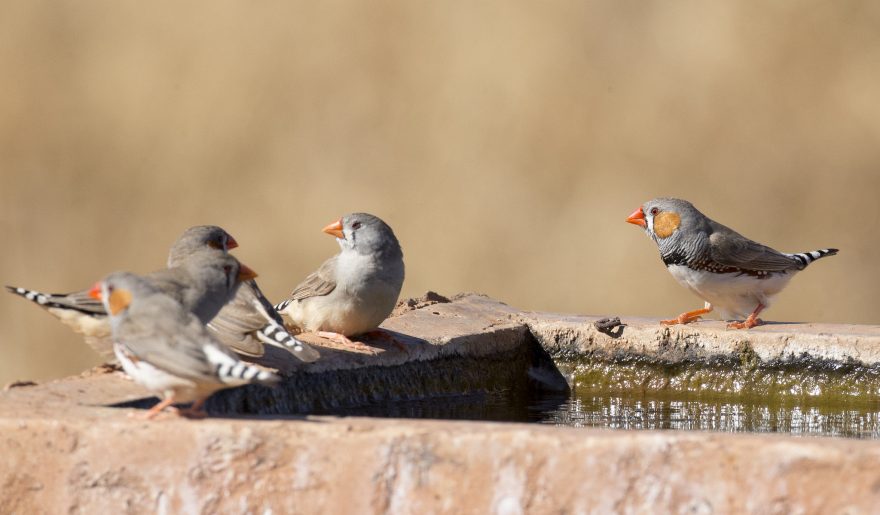Most of the birds we keep in aviculture are indigenous to warmer areas like Africa, Australia, South America and South-East Asia. Though they typically tolerate high temperatures better than humans, extreme heat, prolonged heatwaves, and poor aviary design can result in heat stress and even death.

Provide Baths
The most obvious way to cool your birds is to provide them with a birdbath in which they can frolick about. To prevent drownings, the water needs to be shallow enough that no bird can become completely submerged.
In hot weather, it may be necessary to replace the water frequently. Warm water is a hotbed for bacterial infections, especially when bird droppings fall into it. Baths should be cleaned out daily at a minimum.
Install Misters and Sprinklers
Misters and sprinklers can lower the ambient temperature of the aviary. Misters designed for greenhouses can be configured to switch on automatically throughout the day, which comes it handy if you’re not able to supervise your birds throughout the day.
To prevent the growth of harmful bacteria, it’s important that no part of the aviary is permitted to stay wet throughout the day. Mist that passes through the aviary without ever settling on the ground is ideal.
Offer Semi-Frozen Foods
During hot weather, I treat my lorikeets with nectar slushies. Their wet lorikeet food mix is prepared into ice trays, frozen, and then fed through the food processor. The birds go nuts for it and usually consume the whole bowl straight away.
Foods for other types of birds can also be frozen, or at least chilled. Parrots love really cold grapes, while finches will enjoy picking at refrigerated cucumber.
Provide Electrolyte Supplements
Birds aren’t able to sweat, so instead they cool themselves by opening their beaks and “panting” to push heat from their lungs and exchange it with cooler air. This process also causes them to lose a lot of moisture from their body.
As their body loses water, they also lose elctrolytes, which are minerals (specifically sodium and potassium) that help their body to absorb and retain water.
We can help to reduce the risk of heat stress and dehydration in our birds by offering an electrolyte supplement on hot days. The most popular product in Australia is Vetafarm Spark, which is simply dissolved into their drinking water at a rate of 20ml/litre.
Closing Thoughts
Good aviary design is going to help your birds stay cool far more effectively than any of the above suggestions. Shaded areas, materials that stay cool, and areas that allow for airflow must be considered when designing an aviary.
Lastly, heat related bird deaths are caused by stress. When it’s hot, don’t do anything to exacerbate their stress levels, like entering the aviary, mowing nearby laws, or trying to catch birds.